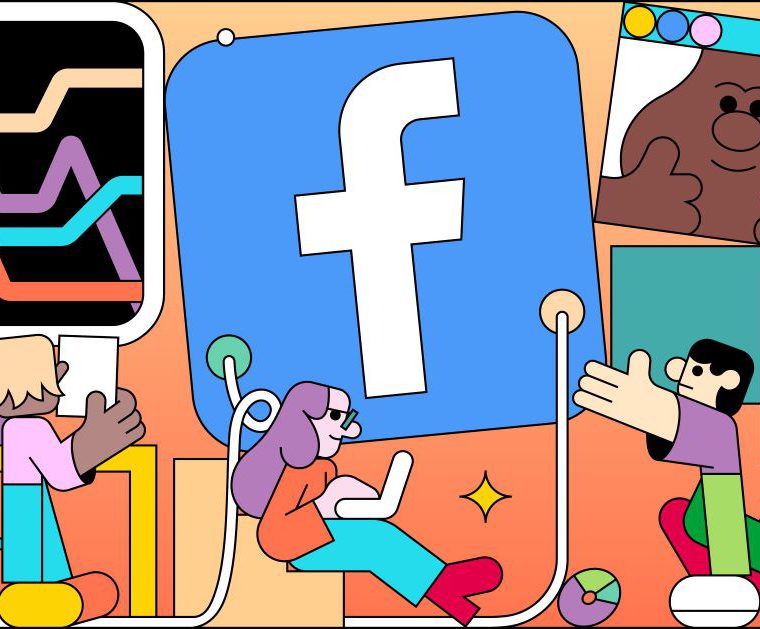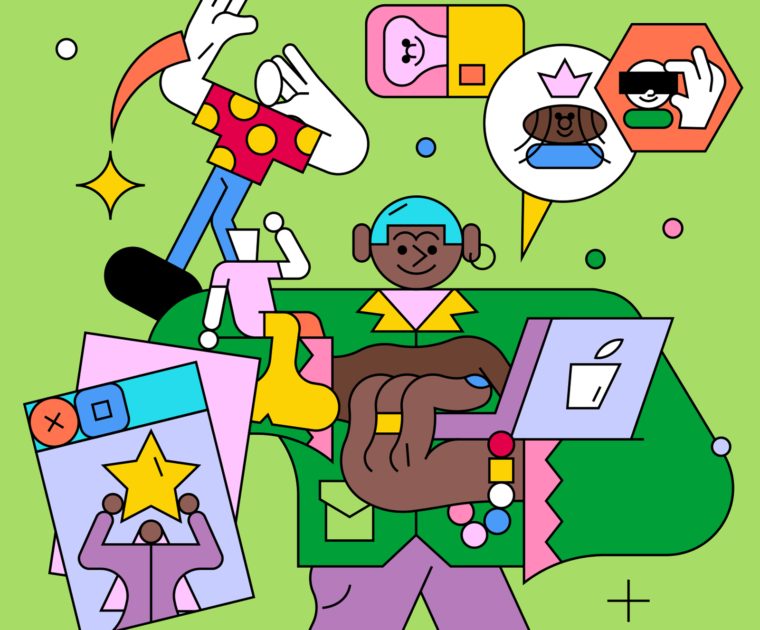In the past year, a new trend emerged that shows the importance of social media influencers and visual content creation. Digital marketers who leverage visuals are seeing significant increases in website traffic, social media engagement, and conversions. With that in mind, visuals should be at the heart of every content marketing strategy. Today, customers even trust people they don’t know more than they do brands. This makes social media influencers a great resource for reaching your target market in an authentic way.
Let’s say you’re trying to get your smokey eye palette in front of millennials. You might enlist a 22 year old beauty YouTube vlogger to do a tutorial and show off the final look. Or perhaps you want photographers to check out your latest DSLR’s. You might get a few into the hands of mega Instagram influencers, so they can use your equipment and demonstrate the amazing photos it takes. No matter who your target demo is, there’s a visual influencer that can present your product in a relatable and engaging way. In fact, every social platform and niche have their own set of ‘super’ influencers with fans that trust their recommendations more than anyone else. Agencies see the value in these niche visual influencers and are repping them on very large-scale campaigns, like Tinker Street, for example.
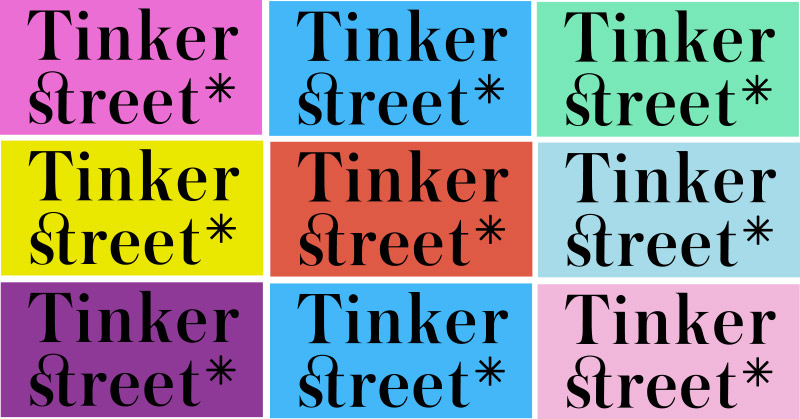
The facts about visual content
- 70% of marketers claim they plan to increase their use of original visual assets in 2015.
- There are 500 hours of video content uploaded to YouTube every minute.
- Tweets with images receive 150% more retweets.
- There are over 40,000 influencers on Instagram covering all verticals, including fashion, beauty, health, and wellness, home decor, food, and more.
- The number of video posts per person has increased 75% globally and 94% in the US.
- Adding a photo URL to your tweet can boost retweets by 35%.
Visual creators are flocking to Instagram
As visual content is on the rise, so too is the social media influencer. Bloggers and digital tastemakers are quickly discovering that they can easily deliver a powerful message that informs action through social media. So, it shouldn’t be any surprise that many influencers are forgoing a website altogether. In the past year, we’ve noticed a lot of visual influencers emerge and they aren’t devoting their time to website development; instead, they’re focusing on social media storytelling. In their eyes, it’s a lot less maintenance, and often, for the same payout. You’ll also notice that these influencers aren’t heavily active across all their social channels. They usually specialize in one particular channel and leave the rest either partially or completely by the wayside. This chart illustrates that movement.
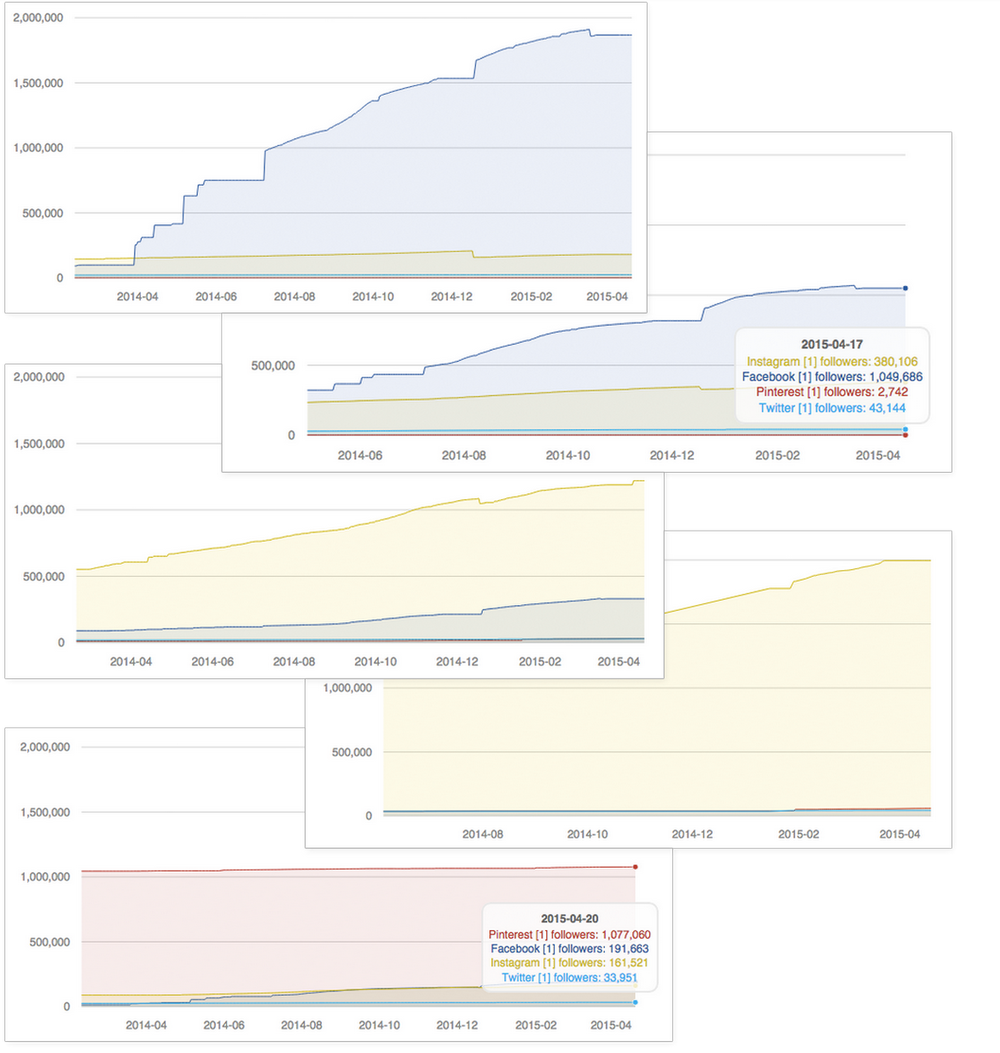
In fact, Instagram is where most influencers post their content before anywhere else, even their websites, giving their fans and readers a window into what’s going on right away. Most DSLR’s give you the ability to send content straight to mobile, meaning an influencer can publish anything to social media right away. Additionally, more and more readers are straying from reading traditional style blogs because they can get the same experience on Instagram, but in a bite-size and digestible format. Brands have taken note, which is why many have set aside ad budgets for standalone Instagram campaigns. It’s no secret that influencers can make a killing from their sponsored social content. Danielle Bernstein of WeWoreWhat recently revealed all to Harpers Bazaar that she can make anywhere between $5,000 to $15,000 on a single piece of sponsored content, like an Instagram shot, and now that she hit 1 million followers on Instagram, she can charge “a good amount more.” Yowzers.
Blogs are still important
The way we share content online isn’t a one-size-fits-all solution. According to style blogger, Nicolette Mason, “There’s a lot of gray area, and it all boils down to why you need the blog. If readers are only looking for pretty photos or style and shopping inspiration, then yes, Instagram might be all they need. But, if they’re looking to join the bigger conversation and engage with really authentic content, they’ll still keep coming back to the site.” The same thing can be true for brands that care primarily about high-quality photography. While using a stand-alone social network as a means of distribution can work for some, others want to showcase their high-quality photos beyond the confines of an Instagram square viewed on mobile.
Below I’ll explore three visual social channels – Instagram, YouTube, and Snapchat – and how you can leverage influencers on each channel to tell your brand story.
How to work with Instagrammers
Instagram has become one of the most engaging visual platforms, with more a billion users actively perusing their feeds. When it comes to this channel, people are looking for relatable and aspirational content but this can be extra challenging for brands and small marketing teams to achieve. Instagram influencers are a great resource because they already have experience creating content that’s catered to their fans, and your ideal target demo. They know what resonates and what doesn’t. Leave content creation in the hands of the right visual influencers and you can trust that it will drive engagement and spur action.
Birchbox partnered up with Instagram influencer, Christina Zilber, Founder of Jouer Cosmetics on an Instagram takeover and giveaway for Mother’s Day. As part of the takeover, she posted four Instagram photos detailing her life in LA. They tied in a giveaway where fans commented on the best beauty tips for moms. The activation resulted in a ton of engagement and 1,135 user-generated posts.
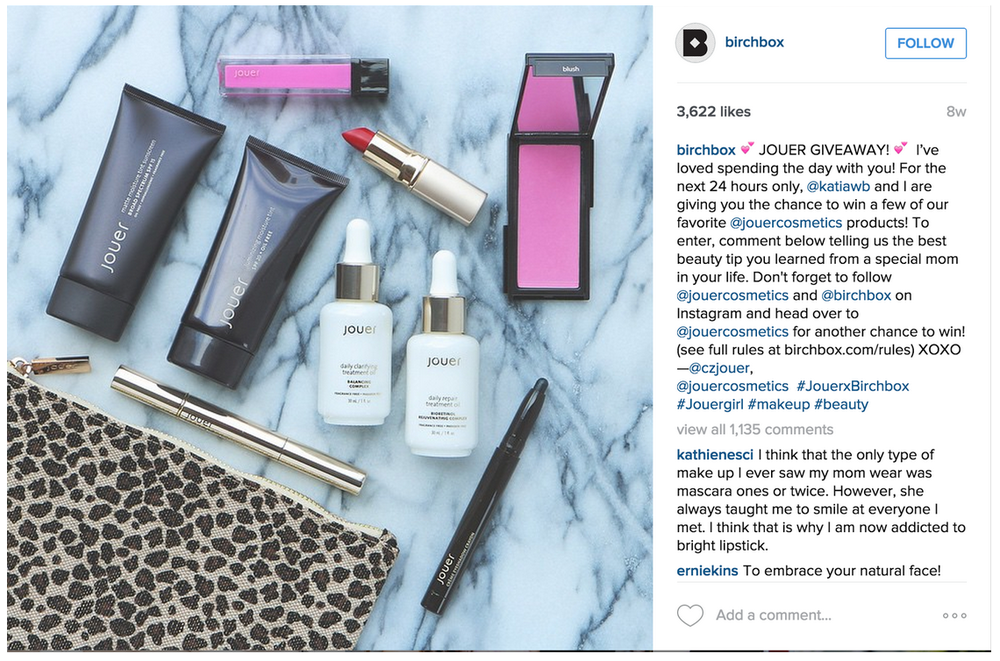
Pro Tip: Encourage Instagram influencers to develop a storyline or visual “day in the life” concept inspired by your products. It’s far more compelling for their fans (and your potential customers) than an endless stream of branded content. Now, that kind of marketing just doesn’t fly on Instagram.
How to work with YouTube Vloggers
With over a billion hours of viewership on YouTube per day, this channel is a force to be reckoned with. Not that vlogging is a new concept but today’s tastemakers have been capitalizing on the phenomenon more than ever in the past year. The most notable vloggers have hundreds of thousands of subscribers and receive millions of views. In turn, they can sell products out in a matter of hours, making them viable marketing channels for many brands. Can you say…digital marketer’s dream come true?!
But most YouTube vloggers don’t get started just to make money, they do it because they love to entertain. YouTuber, Alayna states, “I just love it. I love filming, I love editing, I love seeing everyone’s reactions to my content. I love being able to look back and remember different parts of my life. I love communicating with my viewers. I vlog because I love it.” In fact, this desire to entertain is present in the vast majority of vloggers. By strategically selecting and building relationships with these passionate YouTubers, marketers can tap into engaged audiences that are growing at unprecedented rates.
In a recent favorite, Contiki partnered up with ten YouTube influencers on their annual roadtrip. They created a web series on their YouTube channel to chronicle the YouTubers journey and share the experience with an audience of millions. During their July 2014 RoadTrip, they received over a million views and 30,000 subscribers in one week. Through the YouTubers content alone, they gathered more than 20 million views.
Contiki is a brand that ‘gets’ the YouTube space and how to work with its creators. “The secret to working with YouTubers and digital influencers is collaboration,” says Alexis Sitaropoulos, Group Marketing Director of Contiki. He adds, “Contiki thinks as an editor, networks as a friend and acts as a YouTuber, working with creators to provide the experiences they want for the content on their channels. It really comes down to the quality of our product. When you are confident in the delivery of the experience and trust the creator knows how to engage their audience, you can afford to be less prescriptive.” The entire travel experience was shared in an authentic way that inspired audiences to travel with them.
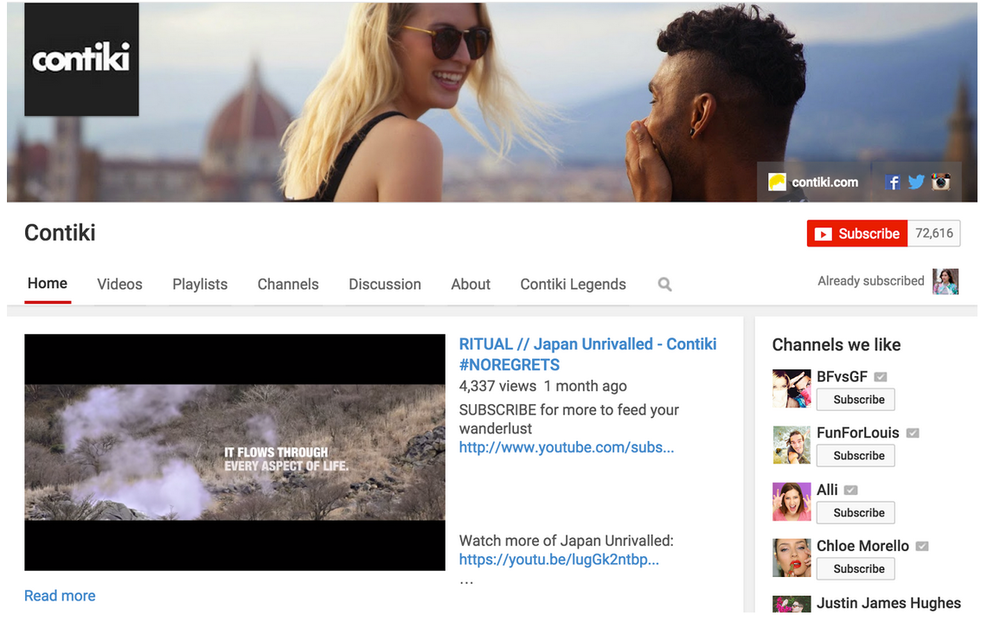
Pro Tip: Encourage creators to be authentic and unscripted when marketing your brand. Whether it’s sharing their visual experience on a fabulous trip or a tutorial on how to apply matte lipstick like a pro, the content should come across as genuine, interesting, and ultimately, it should inspire action.
How to work with Snapchatters
Snapchat is the single best way to share every inch of your life, unedited. This is in stark contrast to most social channels where influencers carefully craft and curate their photos before sharing them with their fans. Snapchat is far more raw and organic, capturing moments as they happen through ten second video and photo clips that get stringed together over a 24 hour period before they disappear for good. It’s this elusive nature that has millennials flocking to the channel at the speed of lightening, leaving behind Facebook, Instagram, and other social channels that are heavily monitored by their parents. While some see it as marketing in the dark, any brand trying to capitalize on the millennial crowd knows they need to be here in full force.
Bloggers are migrating their followers over from the more traditional channels, like Instagram, over to Snapchat for a more human touch. And while brands might be trying to do the same thing, they never come off quite as human as bloggers do, which is why their accounts are a smart place to market their products. “Influencers that have tremendous Instagram followings are gravitating toward Snapchat because it’s more casual,” says Melissa Davis, ShopStyle’s vp. She adds, “They can have more fun with Snapchat and engage with their audience.”
Influencer fans are so obsessed with the Snaps that they’ve been messaging them through Twitter and Instagram to figure out where they can shop the outfit they spotted in this on-the-go footage. It’s this Snapchat craze that prompted ShopStyle, the shopping search engine and sales aggregator, to get involved. In partnership with online retailer, FarFetch, they teamed up with five style bloggers – Jacey Dprie, Natalie Suarez, Geri Hirsch, Courtney Trop, and Christine Andrew – to promote what they’re wearing in their Snapchat stories. As viewers watch the Snaps, they’re directed to shop with a link to ShopStyle’s Snapchat landing page, where every item featured in the Snap can then be found and shopped on FarFetch. The experience is still a bit clunky since the links aren’t live, but since the link is pretty easy to remember – snap.shopstyle.com – it’s pretty much guaranteed that eager fans will make their way over to the site to Add To Cart like crazy.
In a recent move, Snapchat’s CEO, Even Spiegel pitched video ads to advertisers, meaning monetization is in the pipeline. Time will tell if there will be any click-to-buy options within the Snaps. The grounds for Snapchat monetization are so new that we look forward to seeing how brands and influencers get creative with these campaigns.
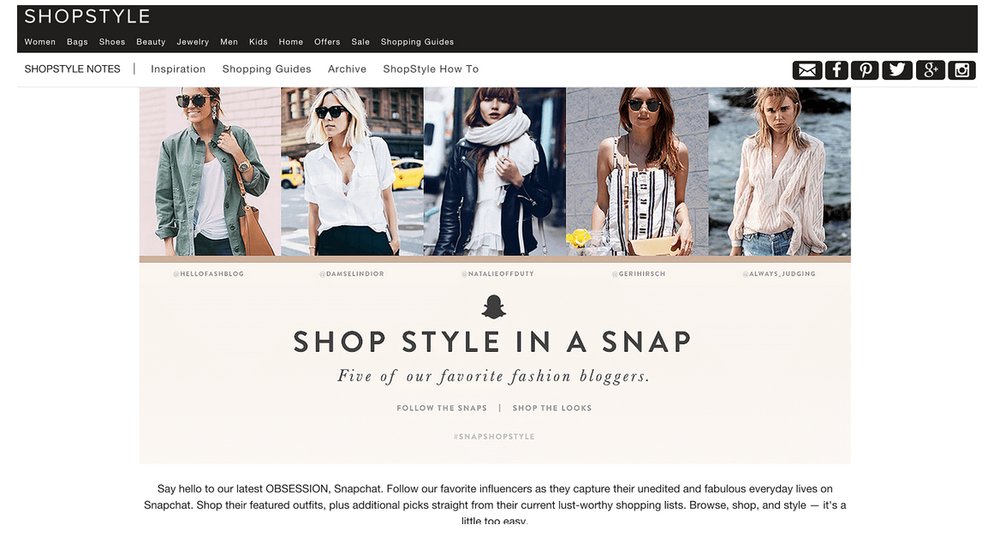
Pro Tip: Remember that Snapchat is meant to feel organic and raw. As we’ve seen from the current Snapchat influencers, their followers end up messaging them for more info on where they got their garb. The influencer’s Snaps shouldn’t become a billboard for your product, so encourage them to integrate your product seamlessly into their everyday regime, and subsequently, their Snaps. As a new and emerging social channel, we’ll see many influencers marketing Snapchat through their other platforms, such as Instagram and Twitter, to drive more followers over to their Snaps.
Get Started Working With Social Media Influencers
Even if your product isn’t the most “photogenic” you can still inspire action through visual content by enlisting the help of social media influencers across Instagram, Snapchat, YouTube, and other platforms. These visual influencers can either rep your brand on a grand scale through their own channels or create content specifically for your channels. These guys are ninjas at taking any product – photogenic or not – and turning it into a visual piece of art that informs, inspires, and relates to your customers. No matter what type of social media influencer you decide to work with, one thing remains true: the influencer needs to tell her own story about your product. Let it be unscripted, real, and authentic. Your product will shine in the end. Need help finding and reaching out to social media influencers? Check out our platform – we got you.




